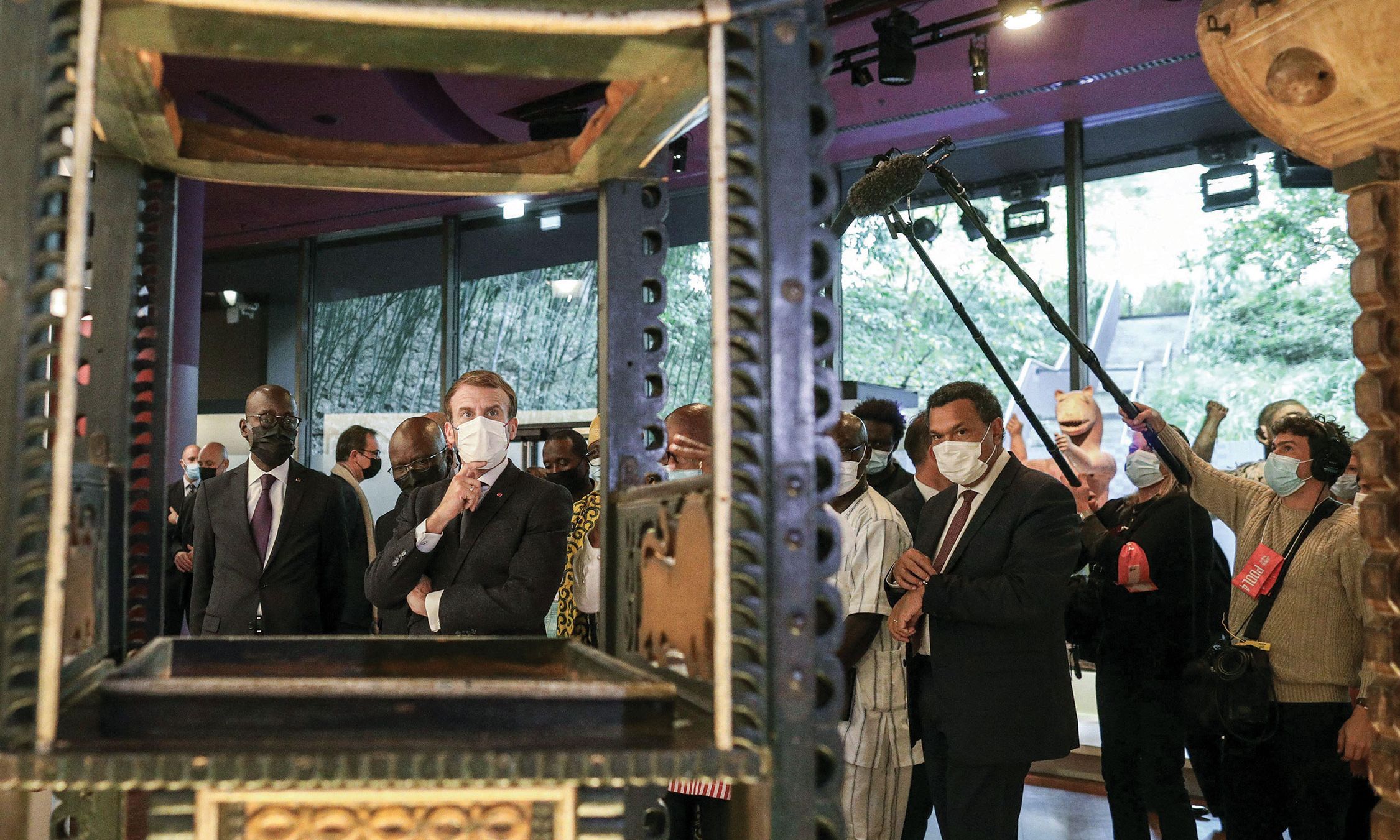President Macron at the Musée du Quai Branly-Jacques Chirac in 2021, where 26 treasures looted from Benin went on show for five days before being returned to the West African country
Abaca Press/Alamy Stock Photo
It is almost five years since President Emmanuel Macron of France announced his revolutionary plan to return African heritage to the continent. His declaration in Burkina Faso in November 2017 that “African heritage can’t just be in European private collections and museums” reignited the debate around colonial artefacts.
But following Macron’s historic declaration, the French government’s position on the restitution of cultural property is “confused”, says the Communist Party activist Pierre Ouzoulias, one of three French senators trying to set up a national expert commission that would be consulted on any future non-European restitution cases.
France has so far repatriated 28 African objects since Macron’s 2017 proclamation: a 19th-century sabre to Senegal and 26 items to Benin. The country has also returned the crown of Madagascar’s last queen, Ranavalona III, as a long-term loan from France’s Army Museum via diplomatic channels, bypassing Parliament.
The restitution journey has been arduous, though. In December 2020, the Senate clashed with the government over a bill that would return 27 colonial-era artefacts in museum collections to Benin and Senegal. Although the National Assembly and the Senate both unanimously approved the bill on its first reading in December 2020, a joint committee of senators and deputies failed to reach an agreement on the final wording the previous month.
The National Assembly has the power to override the Senate, as it did on 17 December 2020 by voting through the restitution bill. Crucially, the then culture minister Roselyne Bachelot warned in November 2020, during a hearing in the Senate, that the government wanted to maintain control of restitutions, which should be decided “case by case”, without the interference of a commission. The newly appointed culture minister, Rima Abdul-Malak, did not respond to a request for comment.
On 10 January, France’s Senate approved a bill—proposed by senators Catherine Morin-Desailly, Max Brisson and Ouzoulias—to set up the aforementioned national expert commission. The draft law also proposes facilitating the restitution of human remains in French public collections. No date has yet been fixed for the bill to be debated in the National Assembly. The Senate draft law may nonetheless be presented from July onwards following the legislative elections this month, when the new lawmakers will take their seats in the National Assembly.
The direction Macron will take is a matter of debate among repatriation experts. Alex Herman, the author of Restitution: The Return of Cultural Artefacts, says: “I look to Macron’s speech of 27 October 2021 at Musée du quai Branly-Jacques Chirac in Paris as an indication of the direction he will likely go: no national commission, but rather a framework for ‘restitutability’ that would allow museums to make their own decisions to deaccession where warranted.” Offering a statutory framework by which restitution can be accomplished would be quite unique in the restitution field, he adds. “It will need to take what has until now been a largely ethical approach and codify it into law,” Herman says.
President Macron meanwhile asked Jean-Luc Martinez, the former director of the Musée du Louvre, to establish a legislative framework for future restitutions. Martinez, who was appointed France’s ambassador for international cooperation on cultural heritage last summer, started the process with a tour that took him to Benin and Senegal.
Ouzoulias tells The Art Newspaper why there has been an impasse. “On the restitution of cultural property, the government’s position is confused. The government explained to Parliament that it was not possible to propose a framework law and that it preferred [to implement] exceptional laws. Then, it entrusted Martinez to work on a framework of [restitution] laws. Martinez, who sat in front of the Senate committee, declined to say what this consists of.” Martinez did not respond to a request for comment but Benoît de Saint Chamas, a diplomatic envoy, says that the work of Martinez is “still in progress” (last month, Martinez was charged in connection with an antiquities trafficking investigation; Martinez has “vigorously denied” all allegations and, via a statement from his lawyer, François Artuphel, “expressed his confidence that he will be completely cleared” of the charges laid against him).
Ouzoulias adds meanwhile: “In the same way, the government did not want to inform us of the requests for restitution submitted by African states. However, we know from sources that several texts are being drafted. The file of [impending] restitutions poses political, legal and scientific problems. It is clear that the Ministry of Culture and the museums have not found the budgetary means to undertake precise inventories nor carry out serious studies on the course of the works. The Felwine Sarr-Bénédicte Savoy report [on restitution, 2018] cannot be considered a serious basis for this inventory work.” Savoy did not respond to a request for comment.

